Business Law: Analyzing Sale of Goods Contract & UCP 600 Issues
VerifiedAdded on 2023/06/09
|11
|3099
|56
Case Study
AI Summary
This business law assignment presents a detailed analysis of a contract for the sale of goods between Beauty Bananas Ltd (BB) and Fresh Fruit Inc. (FF), focusing on obligations under the Convention on International Sale of Goods and the implications of a Bill of Lading. The first issue examines whether Beauty Bananas Ltd (BB) fulfilled its obligations despite discrepancies in the delivered goods, considering the role of the carrier and the documentary evidence provided. The analysis leverages common law principles, the Carriage of Goods by Sea Act 1991, Incoterms 2010, the Hague-Visby Rules, and relevant case law. The second issue delves into the liabilities of the carrier, China Fruit Shipping (CFS), regarding damage to goods, missing cargo, and the impact of refrigeration problems. It also addresses the implications of Beauty Bananas Ltd (BB) bribing the carrier to secure a letter of credit, examining the interplay between the statues governing the transaction and Uniform Customs and Procedures (UCP 600), particularly the fraud exception and the independence principle.
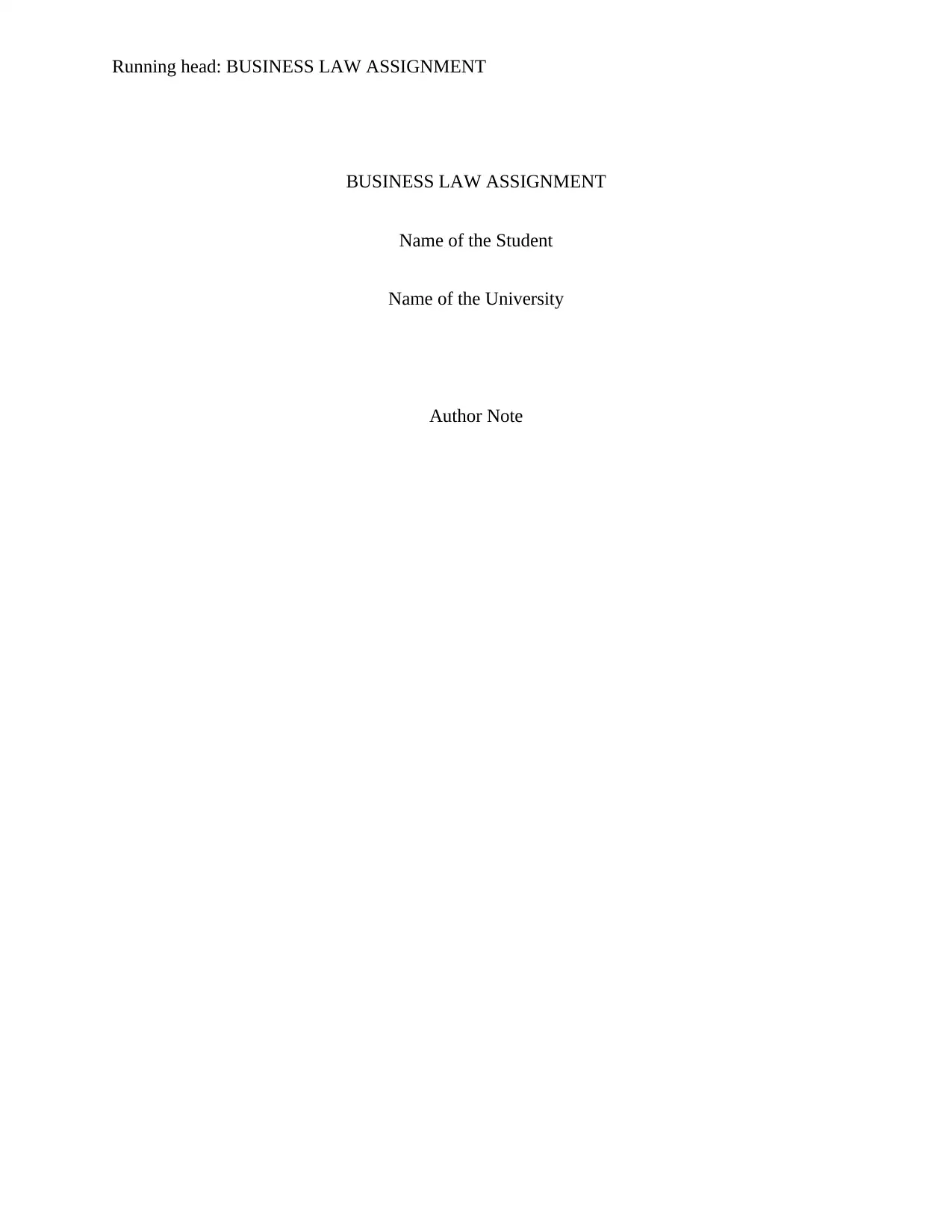
Running head: BUSINESS LAW ASSIGNMENT
BUSINESS LAW ASSIGNMENT
Name of the Student
Name of the University
Author Note
BUSINESS LAW ASSIGNMENT
Name of the Student
Name of the University
Author Note
Paraphrase This Document
Need a fresh take? Get an instant paraphrase of this document with our AI Paraphraser
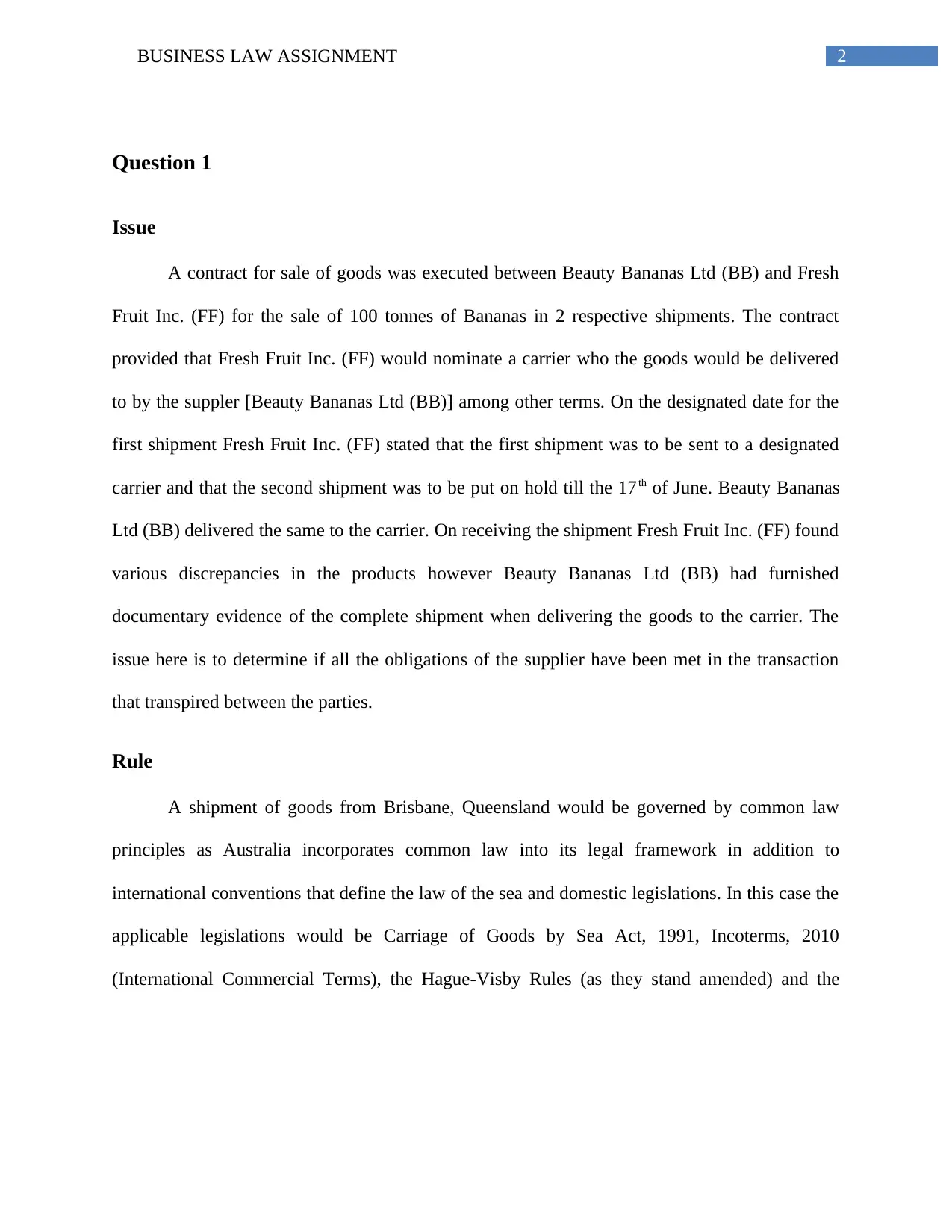
2BUSINESS LAW ASSIGNMENT
Question 1
Issue
A contract for sale of goods was executed between Beauty Bananas Ltd (BB) and Fresh
Fruit Inc. (FF) for the sale of 100 tonnes of Bananas in 2 respective shipments. The contract
provided that Fresh Fruit Inc. (FF) would nominate a carrier who the goods would be delivered
to by the suppler [Beauty Bananas Ltd (BB)] among other terms. On the designated date for the
first shipment Fresh Fruit Inc. (FF) stated that the first shipment was to be sent to a designated
carrier and that the second shipment was to be put on hold till the 17th of June. Beauty Bananas
Ltd (BB) delivered the same to the carrier. On receiving the shipment Fresh Fruit Inc. (FF) found
various discrepancies in the products however Beauty Bananas Ltd (BB) had furnished
documentary evidence of the complete shipment when delivering the goods to the carrier. The
issue here is to determine if all the obligations of the supplier have been met in the transaction
that transpired between the parties.
Rule
A shipment of goods from Brisbane, Queensland would be governed by common law
principles as Australia incorporates common law into its legal framework in addition to
international conventions that define the law of the sea and domestic legislations. In this case the
applicable legislations would be Carriage of Goods by Sea Act, 1991, Incoterms, 2010
(International Commercial Terms), the Hague-Visby Rules (as they stand amended) and the
Question 1
Issue
A contract for sale of goods was executed between Beauty Bananas Ltd (BB) and Fresh
Fruit Inc. (FF) for the sale of 100 tonnes of Bananas in 2 respective shipments. The contract
provided that Fresh Fruit Inc. (FF) would nominate a carrier who the goods would be delivered
to by the suppler [Beauty Bananas Ltd (BB)] among other terms. On the designated date for the
first shipment Fresh Fruit Inc. (FF) stated that the first shipment was to be sent to a designated
carrier and that the second shipment was to be put on hold till the 17th of June. Beauty Bananas
Ltd (BB) delivered the same to the carrier. On receiving the shipment Fresh Fruit Inc. (FF) found
various discrepancies in the products however Beauty Bananas Ltd (BB) had furnished
documentary evidence of the complete shipment when delivering the goods to the carrier. The
issue here is to determine if all the obligations of the supplier have been met in the transaction
that transpired between the parties.
Rule
A shipment of goods from Brisbane, Queensland would be governed by common law
principles as Australia incorporates common law into its legal framework in addition to
international conventions that define the law of the sea and domestic legislations. In this case the
applicable legislations would be Carriage of Goods by Sea Act, 1991, Incoterms, 2010
(International Commercial Terms), the Hague-Visby Rules (as they stand amended) and the
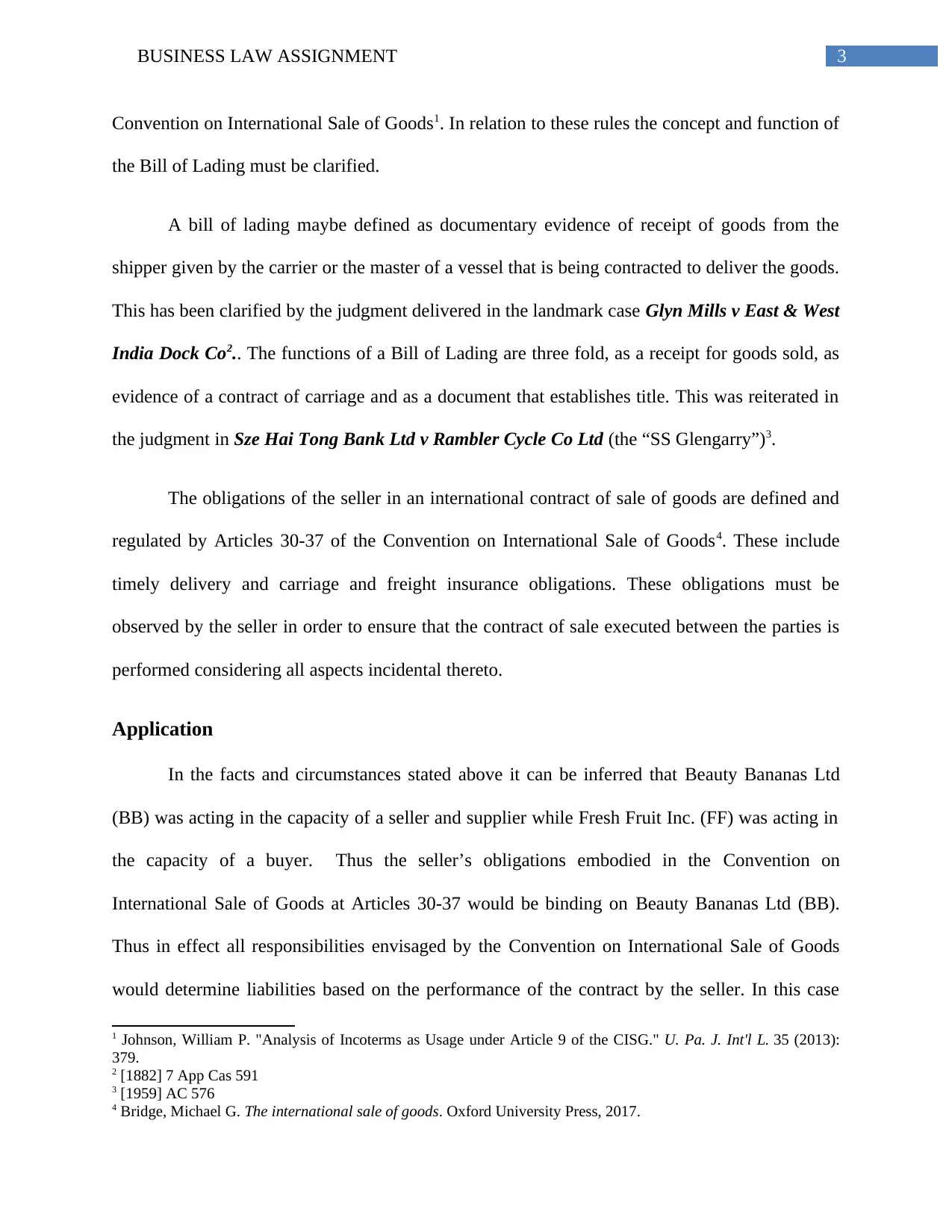
3BUSINESS LAW ASSIGNMENT
Convention on International Sale of Goods1. In relation to these rules the concept and function of
the Bill of Lading must be clarified.
A bill of lading maybe defined as documentary evidence of receipt of goods from the
shipper given by the carrier or the master of a vessel that is being contracted to deliver the goods.
This has been clarified by the judgment delivered in the landmark case Glyn Mills v East & West
India Dock Co2.. The functions of a Bill of Lading are three fold, as a receipt for goods sold, as
evidence of a contract of carriage and as a document that establishes title. This was reiterated in
the judgment in Sze Hai Tong Bank Ltd v Rambler Cycle Co Ltd (the “SS Glengarry”)3.
The obligations of the seller in an international contract of sale of goods are defined and
regulated by Articles 30-37 of the Convention on International Sale of Goods4. These include
timely delivery and carriage and freight insurance obligations. These obligations must be
observed by the seller in order to ensure that the contract of sale executed between the parties is
performed considering all aspects incidental thereto.
Application
In the facts and circumstances stated above it can be inferred that Beauty Bananas Ltd
(BB) was acting in the capacity of a seller and supplier while Fresh Fruit Inc. (FF) was acting in
the capacity of a buyer. Thus the seller’s obligations embodied in the Convention on
International Sale of Goods at Articles 30-37 would be binding on Beauty Bananas Ltd (BB).
Thus in effect all responsibilities envisaged by the Convention on International Sale of Goods
would determine liabilities based on the performance of the contract by the seller. In this case
1 Johnson, William P. "Analysis of Incoterms as Usage under Article 9 of the CISG." U. Pa. J. Int'l L. 35 (2013):
379.
2 [1882] 7 App Cas 591
3 [1959] AC 576
4 Bridge, Michael G. The international sale of goods. Oxford University Press, 2017.
Convention on International Sale of Goods1. In relation to these rules the concept and function of
the Bill of Lading must be clarified.
A bill of lading maybe defined as documentary evidence of receipt of goods from the
shipper given by the carrier or the master of a vessel that is being contracted to deliver the goods.
This has been clarified by the judgment delivered in the landmark case Glyn Mills v East & West
India Dock Co2.. The functions of a Bill of Lading are three fold, as a receipt for goods sold, as
evidence of a contract of carriage and as a document that establishes title. This was reiterated in
the judgment in Sze Hai Tong Bank Ltd v Rambler Cycle Co Ltd (the “SS Glengarry”)3.
The obligations of the seller in an international contract of sale of goods are defined and
regulated by Articles 30-37 of the Convention on International Sale of Goods4. These include
timely delivery and carriage and freight insurance obligations. These obligations must be
observed by the seller in order to ensure that the contract of sale executed between the parties is
performed considering all aspects incidental thereto.
Application
In the facts and circumstances stated above it can be inferred that Beauty Bananas Ltd
(BB) was acting in the capacity of a seller and supplier while Fresh Fruit Inc. (FF) was acting in
the capacity of a buyer. Thus the seller’s obligations embodied in the Convention on
International Sale of Goods at Articles 30-37 would be binding on Beauty Bananas Ltd (BB).
Thus in effect all responsibilities envisaged by the Convention on International Sale of Goods
would determine liabilities based on the performance of the contract by the seller. In this case
1 Johnson, William P. "Analysis of Incoterms as Usage under Article 9 of the CISG." U. Pa. J. Int'l L. 35 (2013):
379.
2 [1882] 7 App Cas 591
3 [1959] AC 576
4 Bridge, Michael G. The international sale of goods. Oxford University Press, 2017.
⊘ This is a preview!⊘
Do you want full access?
Subscribe today to unlock all pages.

Trusted by 1+ million students worldwide
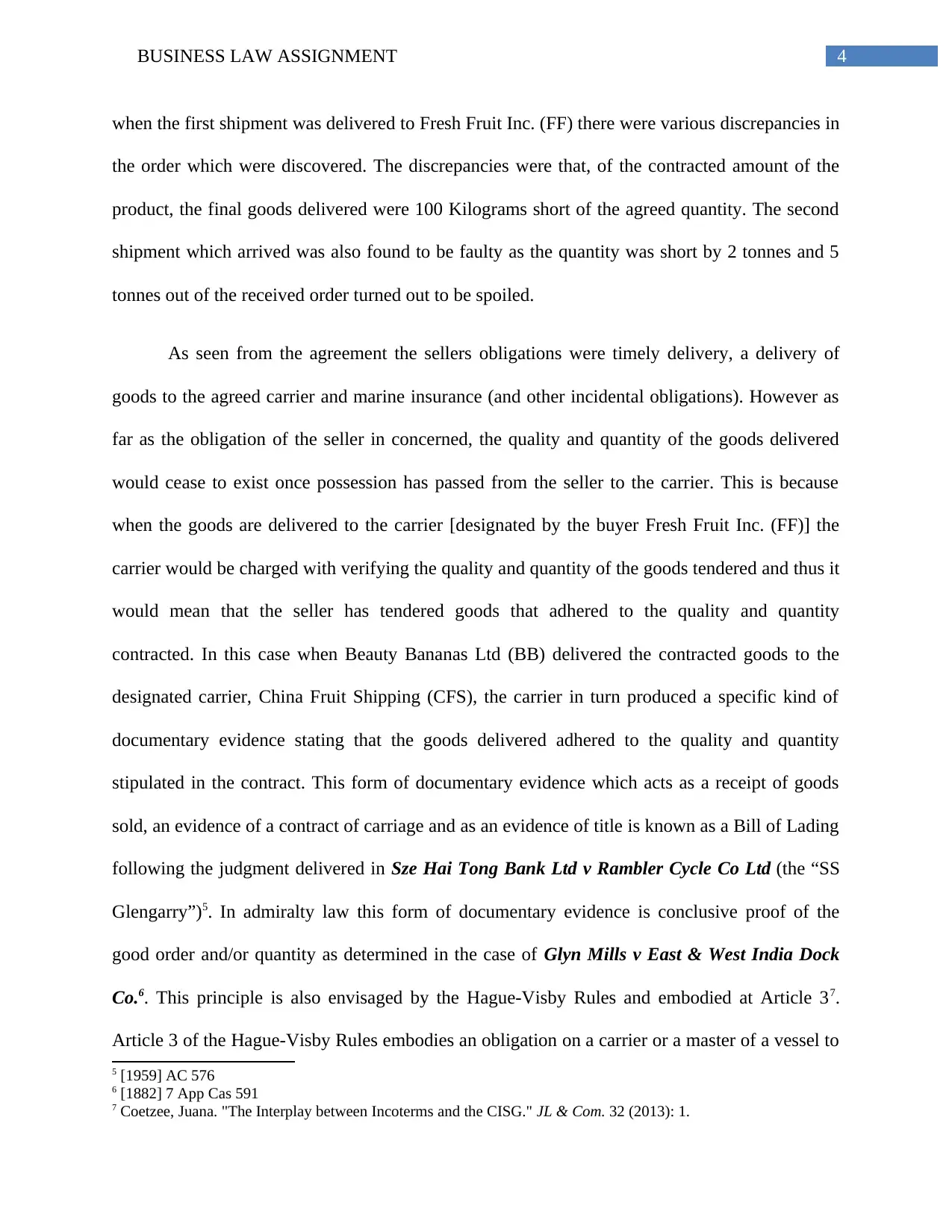
4BUSINESS LAW ASSIGNMENT
when the first shipment was delivered to Fresh Fruit Inc. (FF) there were various discrepancies in
the order which were discovered. The discrepancies were that, of the contracted amount of the
product, the final goods delivered were 100 Kilograms short of the agreed quantity. The second
shipment which arrived was also found to be faulty as the quantity was short by 2 tonnes and 5
tonnes out of the received order turned out to be spoiled.
As seen from the agreement the sellers obligations were timely delivery, a delivery of
goods to the agreed carrier and marine insurance (and other incidental obligations). However as
far as the obligation of the seller in concerned, the quality and quantity of the goods delivered
would cease to exist once possession has passed from the seller to the carrier. This is because
when the goods are delivered to the carrier [designated by the buyer Fresh Fruit Inc. (FF)] the
carrier would be charged with verifying the quality and quantity of the goods tendered and thus it
would mean that the seller has tendered goods that adhered to the quality and quantity
contracted. In this case when Beauty Bananas Ltd (BB) delivered the contracted goods to the
designated carrier, China Fruit Shipping (CFS), the carrier in turn produced a specific kind of
documentary evidence stating that the goods delivered adhered to the quality and quantity
stipulated in the contract. This form of documentary evidence which acts as a receipt of goods
sold, an evidence of a contract of carriage and as an evidence of title is known as a Bill of Lading
following the judgment delivered in Sze Hai Tong Bank Ltd v Rambler Cycle Co Ltd (the “SS
Glengarry”)5. In admiralty law this form of documentary evidence is conclusive proof of the
good order and/or quantity as determined in the case of Glyn Mills v East & West India Dock
Co.6. This principle is also envisaged by the Hague-Visby Rules and embodied at Article 37.
Article 3 of the Hague-Visby Rules embodies an obligation on a carrier or a master of a vessel to
5 [1959] AC 576
6 [1882] 7 App Cas 591
7 Coetzee, Juana. "The Interplay between Incoterms and the CISG." JL & Com. 32 (2013): 1.
when the first shipment was delivered to Fresh Fruit Inc. (FF) there were various discrepancies in
the order which were discovered. The discrepancies were that, of the contracted amount of the
product, the final goods delivered were 100 Kilograms short of the agreed quantity. The second
shipment which arrived was also found to be faulty as the quantity was short by 2 tonnes and 5
tonnes out of the received order turned out to be spoiled.
As seen from the agreement the sellers obligations were timely delivery, a delivery of
goods to the agreed carrier and marine insurance (and other incidental obligations). However as
far as the obligation of the seller in concerned, the quality and quantity of the goods delivered
would cease to exist once possession has passed from the seller to the carrier. This is because
when the goods are delivered to the carrier [designated by the buyer Fresh Fruit Inc. (FF)] the
carrier would be charged with verifying the quality and quantity of the goods tendered and thus it
would mean that the seller has tendered goods that adhered to the quality and quantity
contracted. In this case when Beauty Bananas Ltd (BB) delivered the contracted goods to the
designated carrier, China Fruit Shipping (CFS), the carrier in turn produced a specific kind of
documentary evidence stating that the goods delivered adhered to the quality and quantity
stipulated in the contract. This form of documentary evidence which acts as a receipt of goods
sold, an evidence of a contract of carriage and as an evidence of title is known as a Bill of Lading
following the judgment delivered in Sze Hai Tong Bank Ltd v Rambler Cycle Co Ltd (the “SS
Glengarry”)5. In admiralty law this form of documentary evidence is conclusive proof of the
good order and/or quantity as determined in the case of Glyn Mills v East & West India Dock
Co.6. This principle is also envisaged by the Hague-Visby Rules and embodied at Article 37.
Article 3 of the Hague-Visby Rules embodies an obligation on a carrier or a master of a vessel to
5 [1959] AC 576
6 [1882] 7 App Cas 591
7 Coetzee, Juana. "The Interplay between Incoterms and the CISG." JL & Com. 32 (2013): 1.
Paraphrase This Document
Need a fresh take? Get an instant paraphrase of this document with our AI Paraphraser
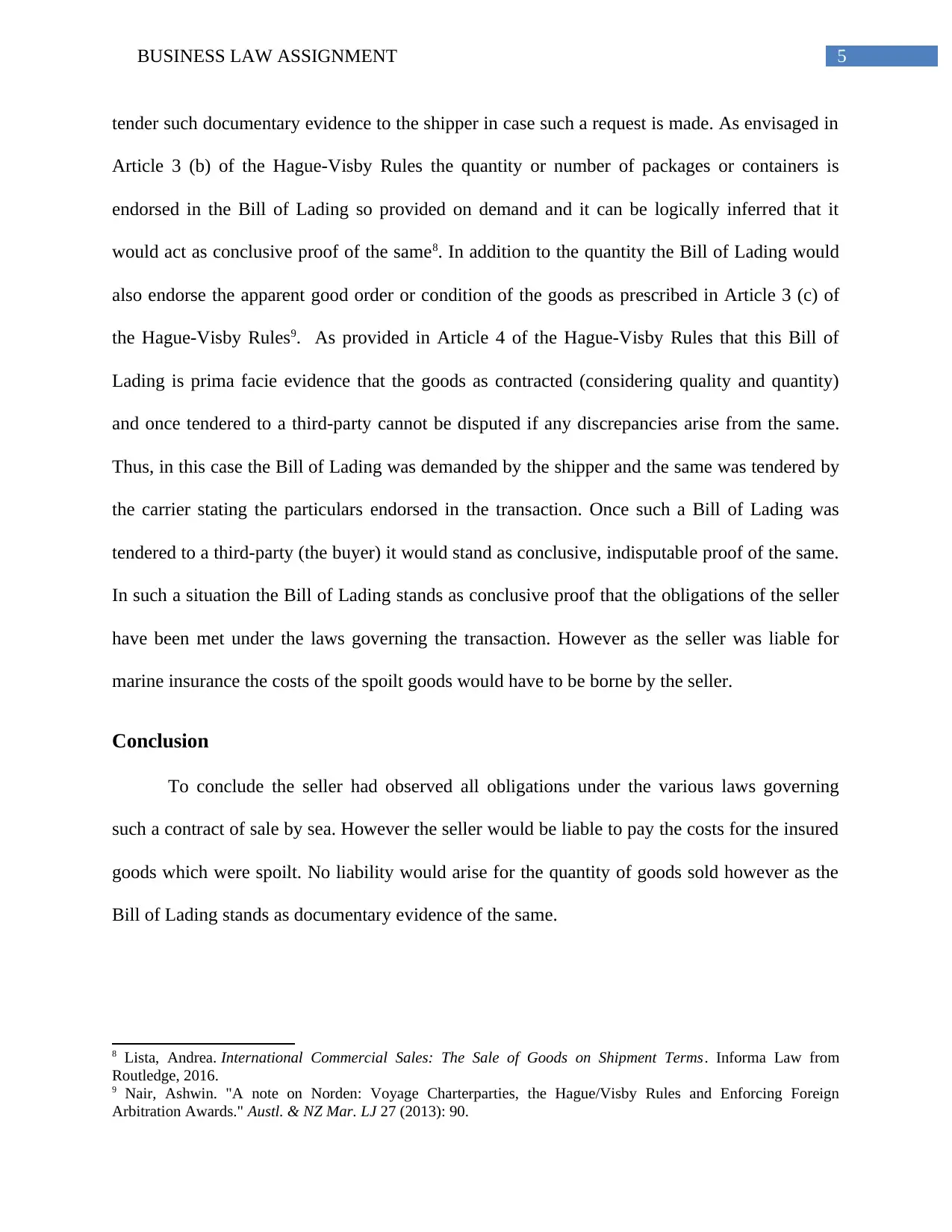
5BUSINESS LAW ASSIGNMENT
tender such documentary evidence to the shipper in case such a request is made. As envisaged in
Article 3 (b) of the Hague-Visby Rules the quantity or number of packages or containers is
endorsed in the Bill of Lading so provided on demand and it can be logically inferred that it
would act as conclusive proof of the same8. In addition to the quantity the Bill of Lading would
also endorse the apparent good order or condition of the goods as prescribed in Article 3 (c) of
the Hague-Visby Rules9. As provided in Article 4 of the Hague-Visby Rules that this Bill of
Lading is prima facie evidence that the goods as contracted (considering quality and quantity)
and once tendered to a third-party cannot be disputed if any discrepancies arise from the same.
Thus, in this case the Bill of Lading was demanded by the shipper and the same was tendered by
the carrier stating the particulars endorsed in the transaction. Once such a Bill of Lading was
tendered to a third-party (the buyer) it would stand as conclusive, indisputable proof of the same.
In such a situation the Bill of Lading stands as conclusive proof that the obligations of the seller
have been met under the laws governing the transaction. However as the seller was liable for
marine insurance the costs of the spoilt goods would have to be borne by the seller.
Conclusion
To conclude the seller had observed all obligations under the various laws governing
such a contract of sale by sea. However the seller would be liable to pay the costs for the insured
goods which were spoilt. No liability would arise for the quantity of goods sold however as the
Bill of Lading stands as documentary evidence of the same.
8 Lista, Andrea. International Commercial Sales: The Sale of Goods on Shipment Terms. Informa Law from
Routledge, 2016.
9 Nair, Ashwin. "A note on Norden: Voyage Charterparties, the Hague/Visby Rules and Enforcing Foreign
Arbitration Awards." Austl. & NZ Mar. LJ 27 (2013): 90.
tender such documentary evidence to the shipper in case such a request is made. As envisaged in
Article 3 (b) of the Hague-Visby Rules the quantity or number of packages or containers is
endorsed in the Bill of Lading so provided on demand and it can be logically inferred that it
would act as conclusive proof of the same8. In addition to the quantity the Bill of Lading would
also endorse the apparent good order or condition of the goods as prescribed in Article 3 (c) of
the Hague-Visby Rules9. As provided in Article 4 of the Hague-Visby Rules that this Bill of
Lading is prima facie evidence that the goods as contracted (considering quality and quantity)
and once tendered to a third-party cannot be disputed if any discrepancies arise from the same.
Thus, in this case the Bill of Lading was demanded by the shipper and the same was tendered by
the carrier stating the particulars endorsed in the transaction. Once such a Bill of Lading was
tendered to a third-party (the buyer) it would stand as conclusive, indisputable proof of the same.
In such a situation the Bill of Lading stands as conclusive proof that the obligations of the seller
have been met under the laws governing the transaction. However as the seller was liable for
marine insurance the costs of the spoilt goods would have to be borne by the seller.
Conclusion
To conclude the seller had observed all obligations under the various laws governing
such a contract of sale by sea. However the seller would be liable to pay the costs for the insured
goods which were spoilt. No liability would arise for the quantity of goods sold however as the
Bill of Lading stands as documentary evidence of the same.
8 Lista, Andrea. International Commercial Sales: The Sale of Goods on Shipment Terms. Informa Law from
Routledge, 2016.
9 Nair, Ashwin. "A note on Norden: Voyage Charterparties, the Hague/Visby Rules and Enforcing Foreign
Arbitration Awards." Austl. & NZ Mar. LJ 27 (2013): 90.
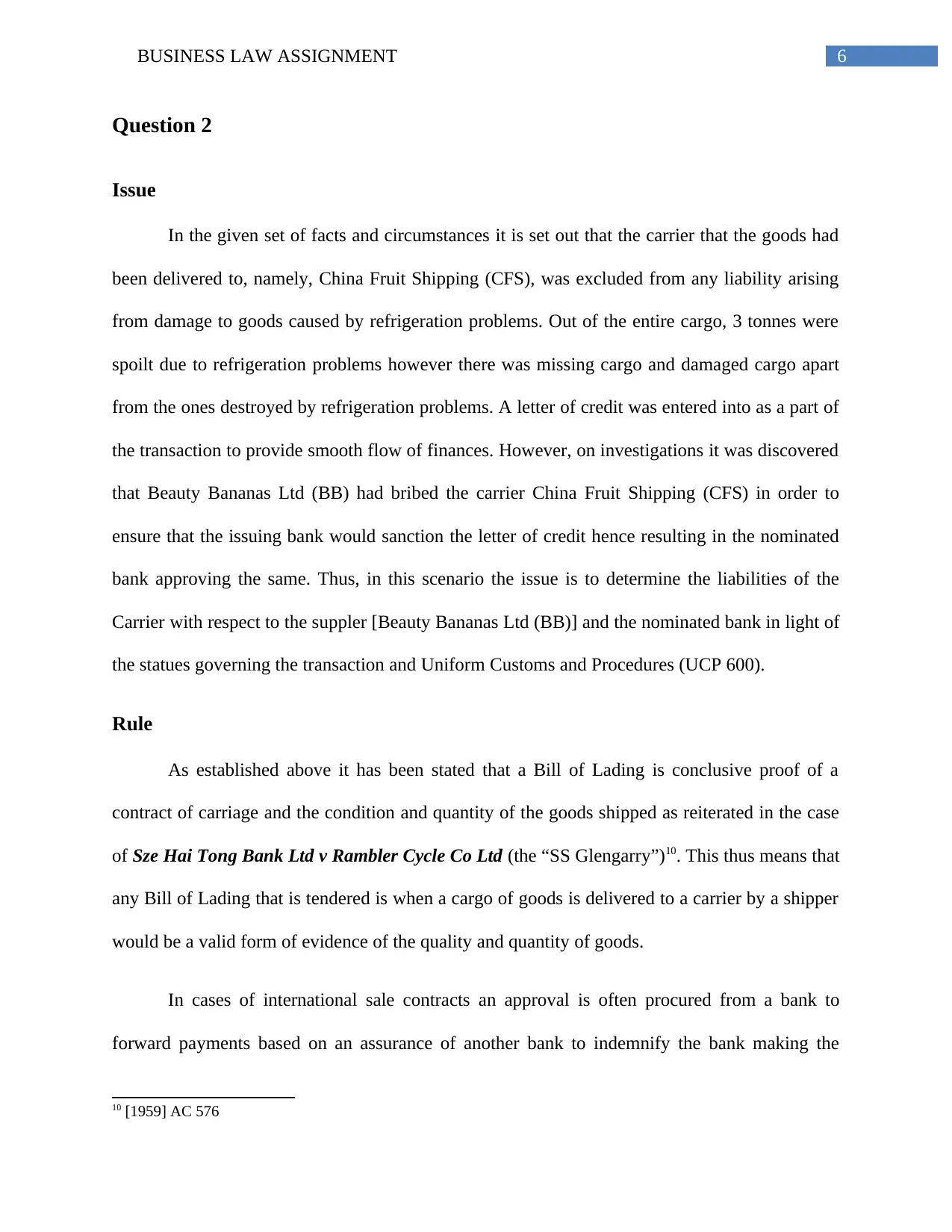
6BUSINESS LAW ASSIGNMENT
Question 2
Issue
In the given set of facts and circumstances it is set out that the carrier that the goods had
been delivered to, namely, China Fruit Shipping (CFS), was excluded from any liability arising
from damage to goods caused by refrigeration problems. Out of the entire cargo, 3 tonnes were
spoilt due to refrigeration problems however there was missing cargo and damaged cargo apart
from the ones destroyed by refrigeration problems. A letter of credit was entered into as a part of
the transaction to provide smooth flow of finances. However, on investigations it was discovered
that Beauty Bananas Ltd (BB) had bribed the carrier China Fruit Shipping (CFS) in order to
ensure that the issuing bank would sanction the letter of credit hence resulting in the nominated
bank approving the same. Thus, in this scenario the issue is to determine the liabilities of the
Carrier with respect to the suppler [Beauty Bananas Ltd (BB)] and the nominated bank in light of
the statues governing the transaction and Uniform Customs and Procedures (UCP 600).
Rule
As established above it has been stated that a Bill of Lading is conclusive proof of a
contract of carriage and the condition and quantity of the goods shipped as reiterated in the case
of Sze Hai Tong Bank Ltd v Rambler Cycle Co Ltd (the “SS Glengarry”)10. This thus means that
any Bill of Lading that is tendered is when a cargo of goods is delivered to a carrier by a shipper
would be a valid form of evidence of the quality and quantity of goods.
In cases of international sale contracts an approval is often procured from a bank to
forward payments based on an assurance of another bank to indemnify the bank making the
10 [1959] AC 576
Question 2
Issue
In the given set of facts and circumstances it is set out that the carrier that the goods had
been delivered to, namely, China Fruit Shipping (CFS), was excluded from any liability arising
from damage to goods caused by refrigeration problems. Out of the entire cargo, 3 tonnes were
spoilt due to refrigeration problems however there was missing cargo and damaged cargo apart
from the ones destroyed by refrigeration problems. A letter of credit was entered into as a part of
the transaction to provide smooth flow of finances. However, on investigations it was discovered
that Beauty Bananas Ltd (BB) had bribed the carrier China Fruit Shipping (CFS) in order to
ensure that the issuing bank would sanction the letter of credit hence resulting in the nominated
bank approving the same. Thus, in this scenario the issue is to determine the liabilities of the
Carrier with respect to the suppler [Beauty Bananas Ltd (BB)] and the nominated bank in light of
the statues governing the transaction and Uniform Customs and Procedures (UCP 600).
Rule
As established above it has been stated that a Bill of Lading is conclusive proof of a
contract of carriage and the condition and quantity of the goods shipped as reiterated in the case
of Sze Hai Tong Bank Ltd v Rambler Cycle Co Ltd (the “SS Glengarry”)10. This thus means that
any Bill of Lading that is tendered is when a cargo of goods is delivered to a carrier by a shipper
would be a valid form of evidence of the quality and quantity of goods.
In cases of international sale contracts an approval is often procured from a bank to
forward payments based on an assurance of another bank to indemnify the bank making the
10 [1959] AC 576
⊘ This is a preview!⊘
Do you want full access?
Subscribe today to unlock all pages.

Trusted by 1+ million students worldwide
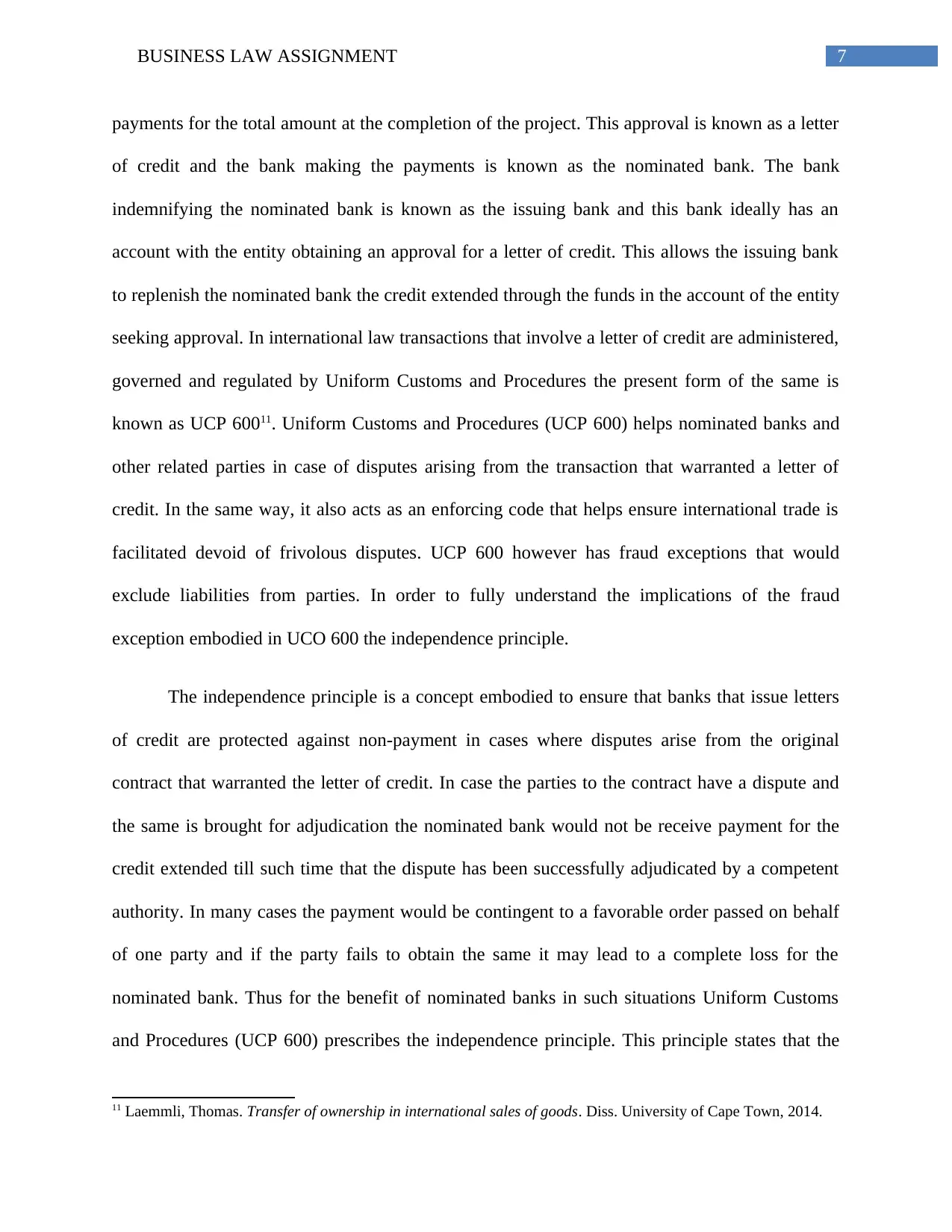
7BUSINESS LAW ASSIGNMENT
payments for the total amount at the completion of the project. This approval is known as a letter
of credit and the bank making the payments is known as the nominated bank. The bank
indemnifying the nominated bank is known as the issuing bank and this bank ideally has an
account with the entity obtaining an approval for a letter of credit. This allows the issuing bank
to replenish the nominated bank the credit extended through the funds in the account of the entity
seeking approval. In international law transactions that involve a letter of credit are administered,
governed and regulated by Uniform Customs and Procedures the present form of the same is
known as UCP 60011. Uniform Customs and Procedures (UCP 600) helps nominated banks and
other related parties in case of disputes arising from the transaction that warranted a letter of
credit. In the same way, it also acts as an enforcing code that helps ensure international trade is
facilitated devoid of frivolous disputes. UCP 600 however has fraud exceptions that would
exclude liabilities from parties. In order to fully understand the implications of the fraud
exception embodied in UCO 600 the independence principle.
The independence principle is a concept embodied to ensure that banks that issue letters
of credit are protected against non-payment in cases where disputes arise from the original
contract that warranted the letter of credit. In case the parties to the contract have a dispute and
the same is brought for adjudication the nominated bank would not be receive payment for the
credit extended till such time that the dispute has been successfully adjudicated by a competent
authority. In many cases the payment would be contingent to a favorable order passed on behalf
of one party and if the party fails to obtain the same it may lead to a complete loss for the
nominated bank. Thus for the benefit of nominated banks in such situations Uniform Customs
and Procedures (UCP 600) prescribes the independence principle. This principle states that the
11 Laemmli, Thomas. Transfer of ownership in international sales of goods. Diss. University of Cape Town, 2014.
payments for the total amount at the completion of the project. This approval is known as a letter
of credit and the bank making the payments is known as the nominated bank. The bank
indemnifying the nominated bank is known as the issuing bank and this bank ideally has an
account with the entity obtaining an approval for a letter of credit. This allows the issuing bank
to replenish the nominated bank the credit extended through the funds in the account of the entity
seeking approval. In international law transactions that involve a letter of credit are administered,
governed and regulated by Uniform Customs and Procedures the present form of the same is
known as UCP 60011. Uniform Customs and Procedures (UCP 600) helps nominated banks and
other related parties in case of disputes arising from the transaction that warranted a letter of
credit. In the same way, it also acts as an enforcing code that helps ensure international trade is
facilitated devoid of frivolous disputes. UCP 600 however has fraud exceptions that would
exclude liabilities from parties. In order to fully understand the implications of the fraud
exception embodied in UCO 600 the independence principle.
The independence principle is a concept embodied to ensure that banks that issue letters
of credit are protected against non-payment in cases where disputes arise from the original
contract that warranted the letter of credit. In case the parties to the contract have a dispute and
the same is brought for adjudication the nominated bank would not be receive payment for the
credit extended till such time that the dispute has been successfully adjudicated by a competent
authority. In many cases the payment would be contingent to a favorable order passed on behalf
of one party and if the party fails to obtain the same it may lead to a complete loss for the
nominated bank. Thus for the benefit of nominated banks in such situations Uniform Customs
and Procedures (UCP 600) prescribes the independence principle. This principle states that the
11 Laemmli, Thomas. Transfer of ownership in international sales of goods. Diss. University of Cape Town, 2014.
Paraphrase This Document
Need a fresh take? Get an instant paraphrase of this document with our AI Paraphraser
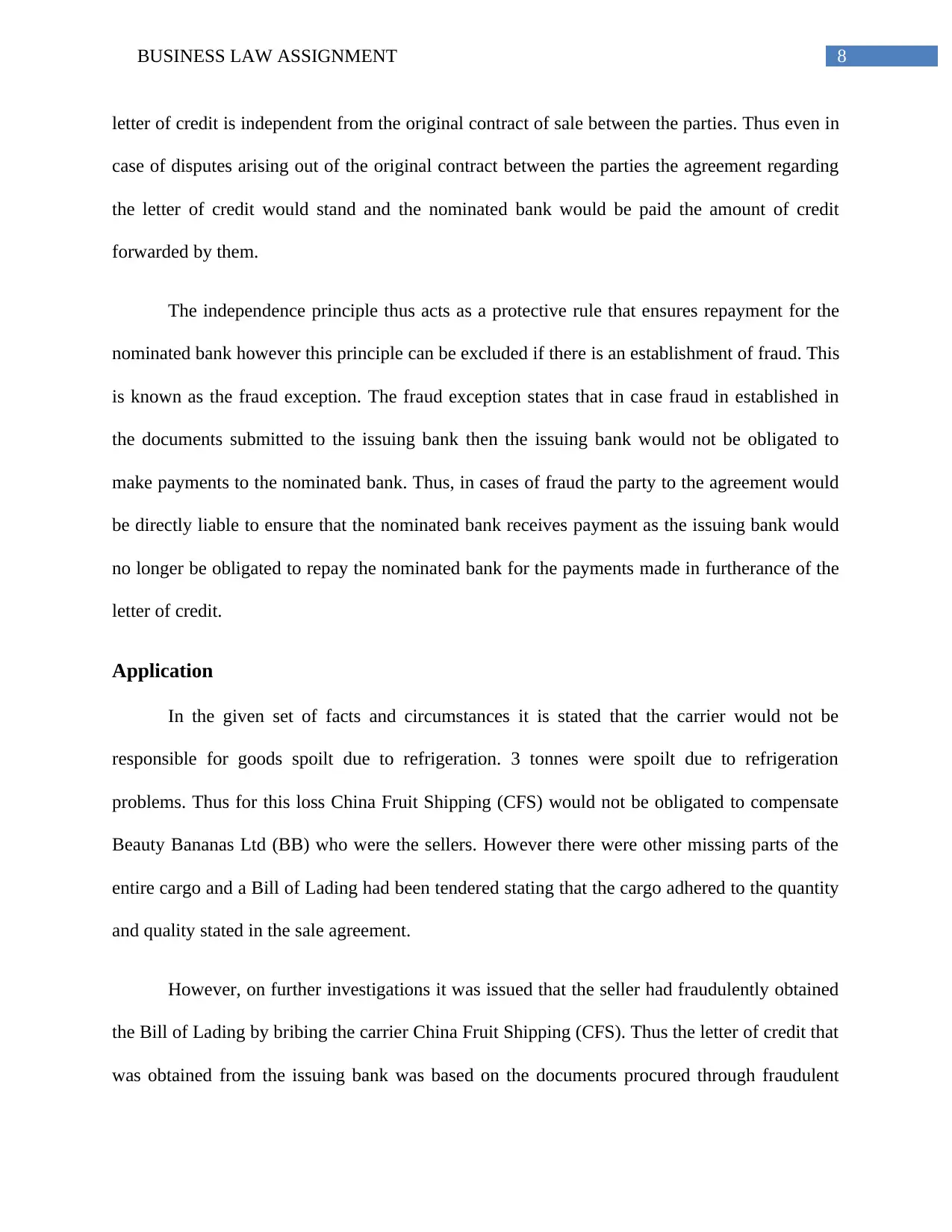
8BUSINESS LAW ASSIGNMENT
letter of credit is independent from the original contract of sale between the parties. Thus even in
case of disputes arising out of the original contract between the parties the agreement regarding
the letter of credit would stand and the nominated bank would be paid the amount of credit
forwarded by them.
The independence principle thus acts as a protective rule that ensures repayment for the
nominated bank however this principle can be excluded if there is an establishment of fraud. This
is known as the fraud exception. The fraud exception states that in case fraud in established in
the documents submitted to the issuing bank then the issuing bank would not be obligated to
make payments to the nominated bank. Thus, in cases of fraud the party to the agreement would
be directly liable to ensure that the nominated bank receives payment as the issuing bank would
no longer be obligated to repay the nominated bank for the payments made in furtherance of the
letter of credit.
Application
In the given set of facts and circumstances it is stated that the carrier would not be
responsible for goods spoilt due to refrigeration. 3 tonnes were spoilt due to refrigeration
problems. Thus for this loss China Fruit Shipping (CFS) would not be obligated to compensate
Beauty Bananas Ltd (BB) who were the sellers. However there were other missing parts of the
entire cargo and a Bill of Lading had been tendered stating that the cargo adhered to the quantity
and quality stated in the sale agreement.
However, on further investigations it was issued that the seller had fraudulently obtained
the Bill of Lading by bribing the carrier China Fruit Shipping (CFS). Thus the letter of credit that
was obtained from the issuing bank was based on the documents procured through fraudulent
letter of credit is independent from the original contract of sale between the parties. Thus even in
case of disputes arising out of the original contract between the parties the agreement regarding
the letter of credit would stand and the nominated bank would be paid the amount of credit
forwarded by them.
The independence principle thus acts as a protective rule that ensures repayment for the
nominated bank however this principle can be excluded if there is an establishment of fraud. This
is known as the fraud exception. The fraud exception states that in case fraud in established in
the documents submitted to the issuing bank then the issuing bank would not be obligated to
make payments to the nominated bank. Thus, in cases of fraud the party to the agreement would
be directly liable to ensure that the nominated bank receives payment as the issuing bank would
no longer be obligated to repay the nominated bank for the payments made in furtherance of the
letter of credit.
Application
In the given set of facts and circumstances it is stated that the carrier would not be
responsible for goods spoilt due to refrigeration. 3 tonnes were spoilt due to refrigeration
problems. Thus for this loss China Fruit Shipping (CFS) would not be obligated to compensate
Beauty Bananas Ltd (BB) who were the sellers. However there were other missing parts of the
entire cargo and a Bill of Lading had been tendered stating that the cargo adhered to the quantity
and quality stated in the sale agreement.
However, on further investigations it was issued that the seller had fraudulently obtained
the Bill of Lading by bribing the carrier China Fruit Shipping (CFS). Thus the letter of credit that
was obtained from the issuing bank was based on the documents procured through fraudulent
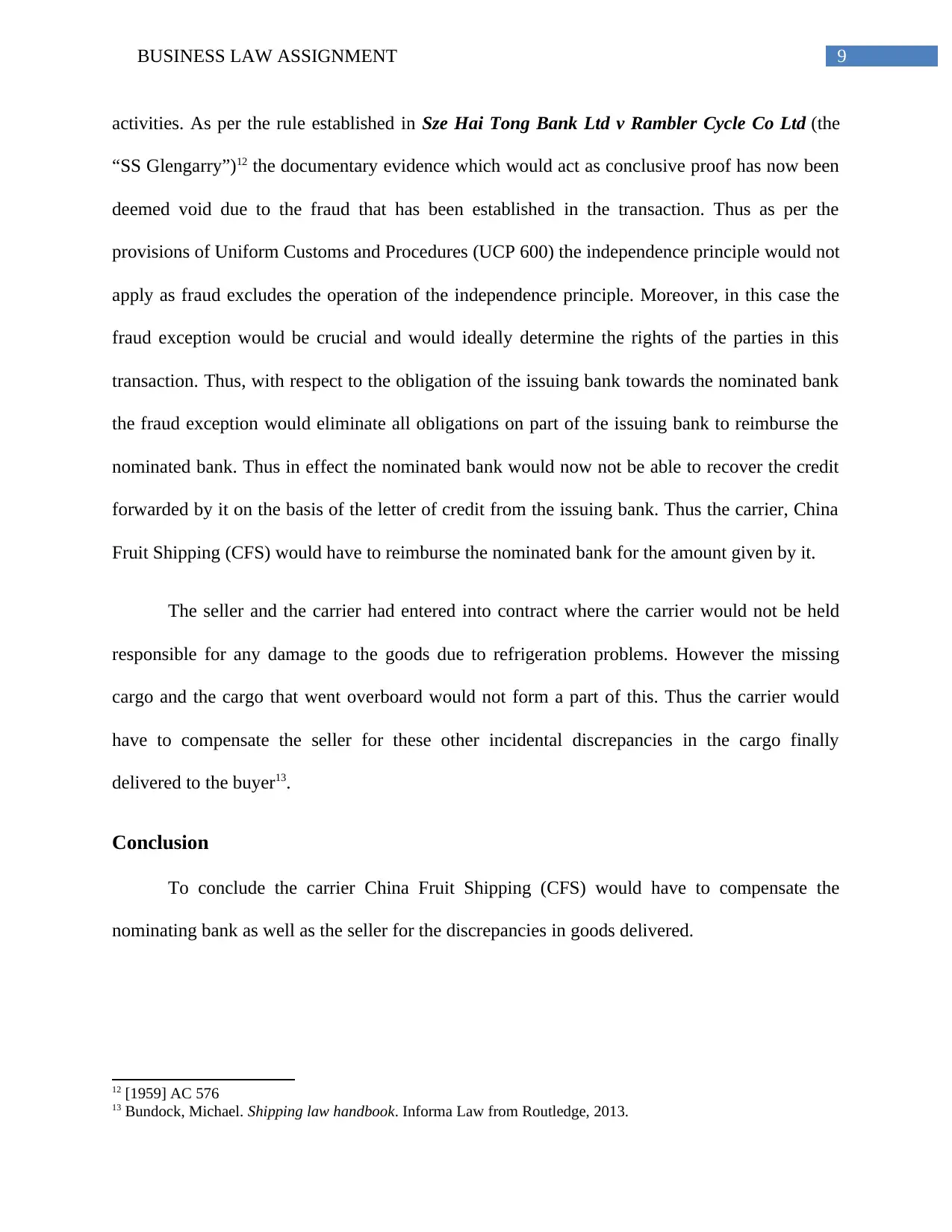
9BUSINESS LAW ASSIGNMENT
activities. As per the rule established in Sze Hai Tong Bank Ltd v Rambler Cycle Co Ltd (the
“SS Glengarry”)12 the documentary evidence which would act as conclusive proof has now been
deemed void due to the fraud that has been established in the transaction. Thus as per the
provisions of Uniform Customs and Procedures (UCP 600) the independence principle would not
apply as fraud excludes the operation of the independence principle. Moreover, in this case the
fraud exception would be crucial and would ideally determine the rights of the parties in this
transaction. Thus, with respect to the obligation of the issuing bank towards the nominated bank
the fraud exception would eliminate all obligations on part of the issuing bank to reimburse the
nominated bank. Thus in effect the nominated bank would now not be able to recover the credit
forwarded by it on the basis of the letter of credit from the issuing bank. Thus the carrier, China
Fruit Shipping (CFS) would have to reimburse the nominated bank for the amount given by it.
The seller and the carrier had entered into contract where the carrier would not be held
responsible for any damage to the goods due to refrigeration problems. However the missing
cargo and the cargo that went overboard would not form a part of this. Thus the carrier would
have to compensate the seller for these other incidental discrepancies in the cargo finally
delivered to the buyer13.
Conclusion
To conclude the carrier China Fruit Shipping (CFS) would have to compensate the
nominating bank as well as the seller for the discrepancies in goods delivered.
12 [1959] AC 576
13 Bundock, Michael. Shipping law handbook. Informa Law from Routledge, 2013.
activities. As per the rule established in Sze Hai Tong Bank Ltd v Rambler Cycle Co Ltd (the
“SS Glengarry”)12 the documentary evidence which would act as conclusive proof has now been
deemed void due to the fraud that has been established in the transaction. Thus as per the
provisions of Uniform Customs and Procedures (UCP 600) the independence principle would not
apply as fraud excludes the operation of the independence principle. Moreover, in this case the
fraud exception would be crucial and would ideally determine the rights of the parties in this
transaction. Thus, with respect to the obligation of the issuing bank towards the nominated bank
the fraud exception would eliminate all obligations on part of the issuing bank to reimburse the
nominated bank. Thus in effect the nominated bank would now not be able to recover the credit
forwarded by it on the basis of the letter of credit from the issuing bank. Thus the carrier, China
Fruit Shipping (CFS) would have to reimburse the nominated bank for the amount given by it.
The seller and the carrier had entered into contract where the carrier would not be held
responsible for any damage to the goods due to refrigeration problems. However the missing
cargo and the cargo that went overboard would not form a part of this. Thus the carrier would
have to compensate the seller for these other incidental discrepancies in the cargo finally
delivered to the buyer13.
Conclusion
To conclude the carrier China Fruit Shipping (CFS) would have to compensate the
nominating bank as well as the seller for the discrepancies in goods delivered.
12 [1959] AC 576
13 Bundock, Michael. Shipping law handbook. Informa Law from Routledge, 2013.
⊘ This is a preview!⊘
Do you want full access?
Subscribe today to unlock all pages.

Trusted by 1+ million students worldwide
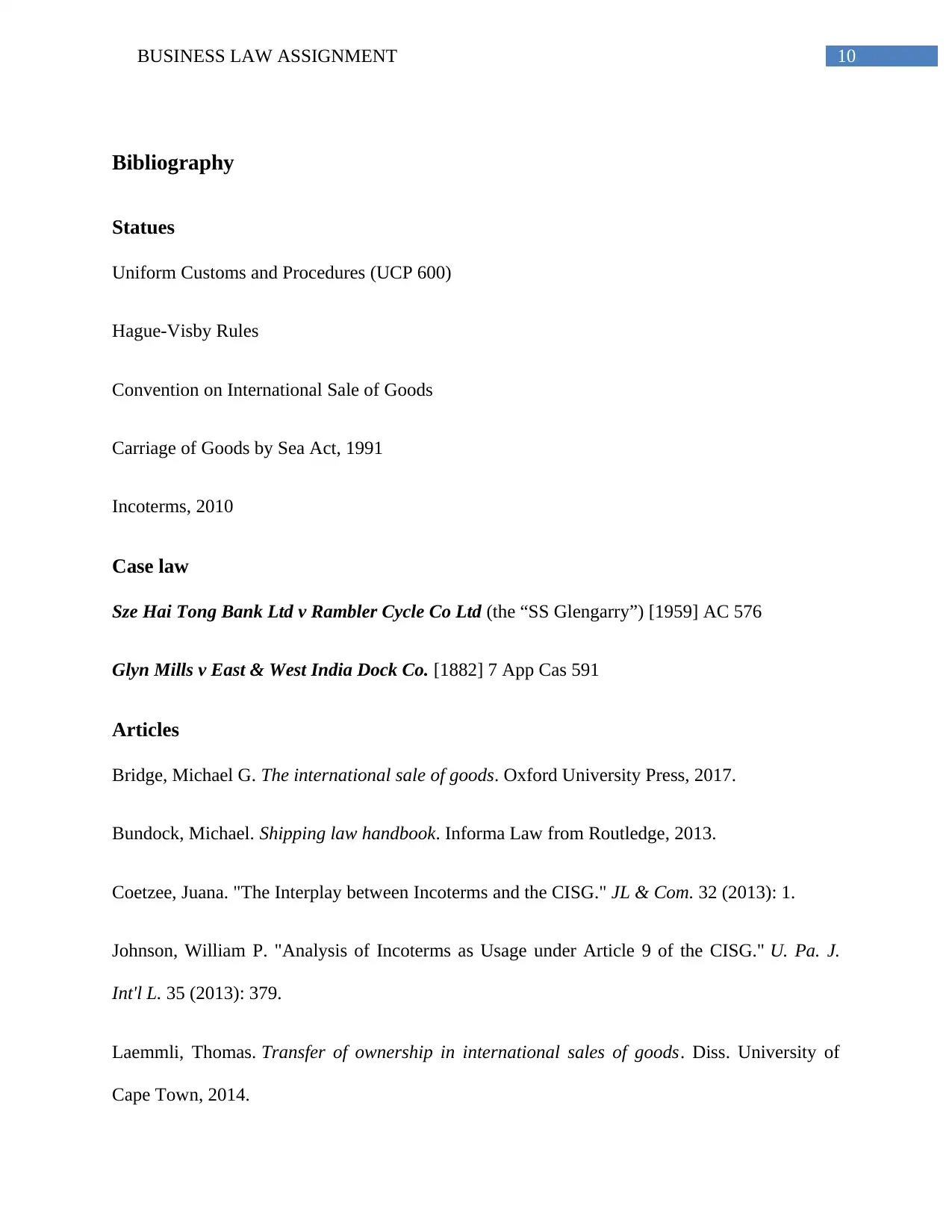
10BUSINESS LAW ASSIGNMENT
Bibliography
Statues
Uniform Customs and Procedures (UCP 600)
Hague-Visby Rules
Convention on International Sale of Goods
Carriage of Goods by Sea Act, 1991
Incoterms, 2010
Case law
Sze Hai Tong Bank Ltd v Rambler Cycle Co Ltd (the “SS Glengarry”) [1959] AC 576
Glyn Mills v East & West India Dock Co. [1882] 7 App Cas 591
Articles
Bridge, Michael G. The international sale of goods. Oxford University Press, 2017.
Bundock, Michael. Shipping law handbook. Informa Law from Routledge, 2013.
Coetzee, Juana. "The Interplay between Incoterms and the CISG." JL & Com. 32 (2013): 1.
Johnson, William P. "Analysis of Incoterms as Usage under Article 9 of the CISG." U. Pa. J.
Int'l L. 35 (2013): 379.
Laemmli, Thomas. Transfer of ownership in international sales of goods. Diss. University of
Cape Town, 2014.
Bibliography
Statues
Uniform Customs and Procedures (UCP 600)
Hague-Visby Rules
Convention on International Sale of Goods
Carriage of Goods by Sea Act, 1991
Incoterms, 2010
Case law
Sze Hai Tong Bank Ltd v Rambler Cycle Co Ltd (the “SS Glengarry”) [1959] AC 576
Glyn Mills v East & West India Dock Co. [1882] 7 App Cas 591
Articles
Bridge, Michael G. The international sale of goods. Oxford University Press, 2017.
Bundock, Michael. Shipping law handbook. Informa Law from Routledge, 2013.
Coetzee, Juana. "The Interplay between Incoterms and the CISG." JL & Com. 32 (2013): 1.
Johnson, William P. "Analysis of Incoterms as Usage under Article 9 of the CISG." U. Pa. J.
Int'l L. 35 (2013): 379.
Laemmli, Thomas. Transfer of ownership in international sales of goods. Diss. University of
Cape Town, 2014.
Paraphrase This Document
Need a fresh take? Get an instant paraphrase of this document with our AI Paraphraser

11BUSINESS LAW ASSIGNMENT
Lista, Andrea. International Commercial Sales: The Sale of Goods on Shipment Terms. Informa
Law from Routledge, 2016.
Nair, Ashwin. "A note on Norden: Voyage Charterparties, the Hague/Visby Rules and Enforcing
Foreign Arbitration Awards." Austl. & NZ Mar. LJ 27 (2013): 90.
Lista, Andrea. International Commercial Sales: The Sale of Goods on Shipment Terms. Informa
Law from Routledge, 2016.
Nair, Ashwin. "A note on Norden: Voyage Charterparties, the Hague/Visby Rules and Enforcing
Foreign Arbitration Awards." Austl. & NZ Mar. LJ 27 (2013): 90.
1 out of 11
Related Documents
Your All-in-One AI-Powered Toolkit for Academic Success.
+13062052269
info@desklib.com
Available 24*7 on WhatsApp / Email
![[object Object]](/_next/static/media/star-bottom.7253800d.svg)
Unlock your academic potential
Copyright © 2020–2025 A2Z Services. All Rights Reserved. Developed and managed by ZUCOL.





